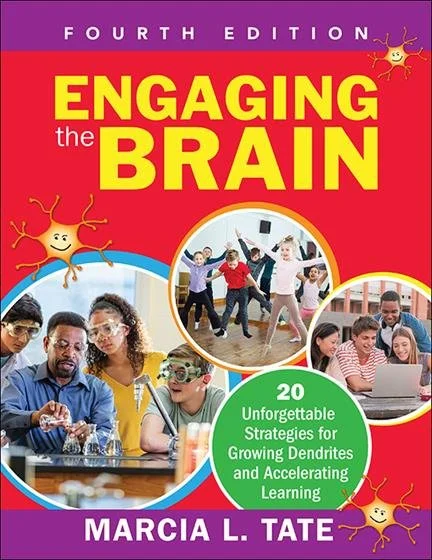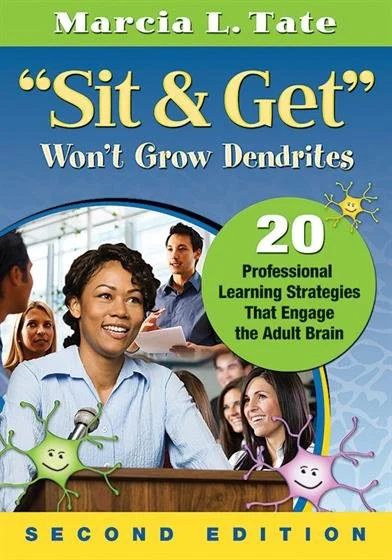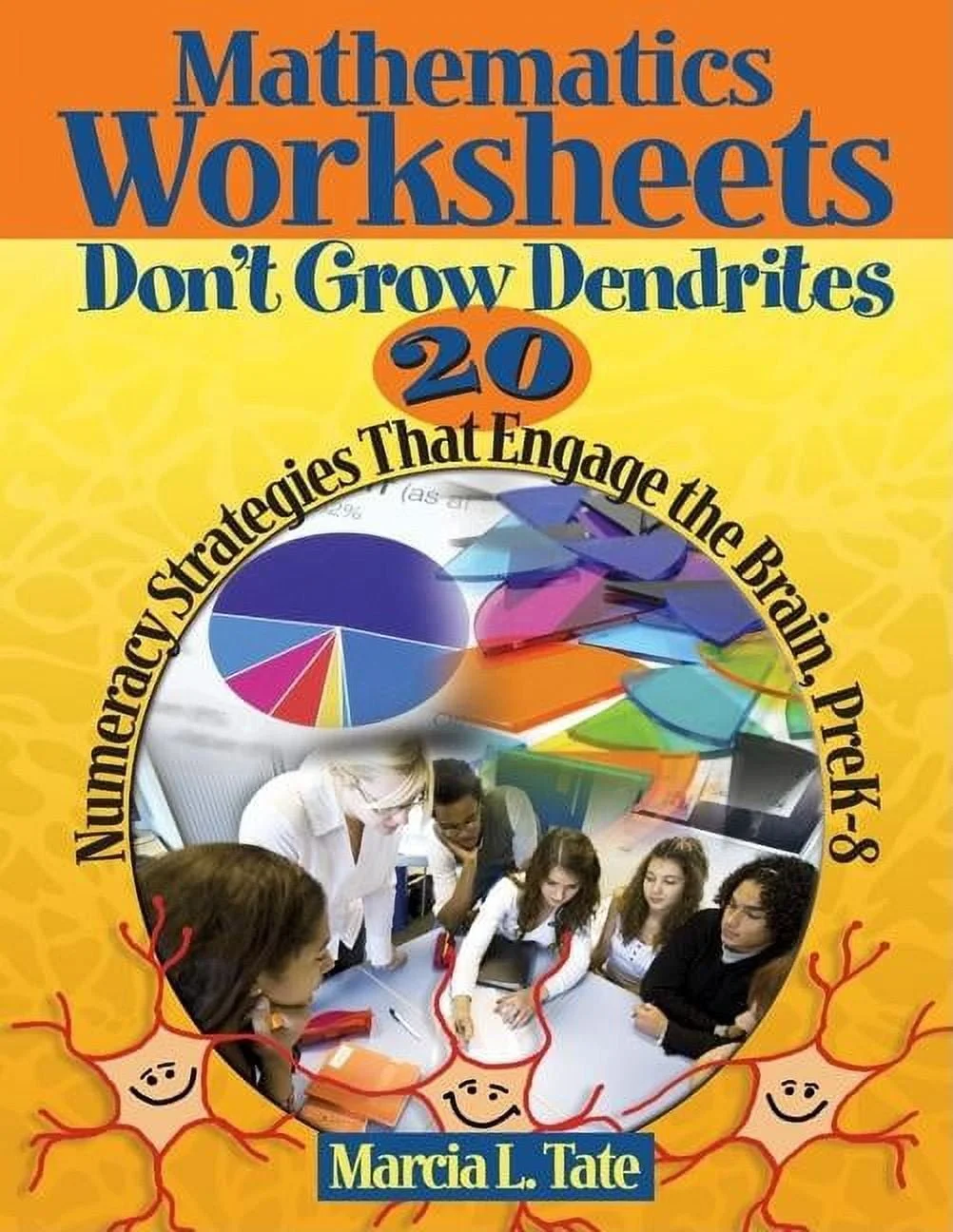
books
Dr. Marcia Tate is the author of numerous bestsellers, which are listed and described below. To purchase your copy of any of these titles, please click on the accompanying link.
Engaging the Brain: 20 Unforgettable Strategies for Growing Dendrites and Accelerating Learning
It stands to reason that if students don't learn the way we teach them, then we must teach them the way they learn! In this fourth edition of her bestseller, Worksheets Don't Grow Dendrites: 20 Instructional Strategies that Engage the Brain, encounter Dr. Marcia Tate's 20 brain-compatible strategies that should be used to teach any student anything, regardless of the content area or grade level! Explore over 200 pieces of research on why these strategies work for the brain and more than 150 practical, cross-curricular activities for integrating them into your classroom. At the end of each chapter is an Action Plan enabling you to reflect on how to incorporate these 20 strategies into your lessons. Then, view the brain-compatible lesson design template and sample lessons in the Resource section. You will find this text an invaluable addition to your professional library since the strategies contained in it not only increase academic achievement and decrease behavior problems for all students they also make teaching and learning so much fun!
Healthy Teachers, Happy Classrooms: Twelve Brain-based Principles to Avoid Burnout, Increase Optimism, and Support Physical Well-Being
Written during the pandemic when educators were leaving the profession in record numbers, this book was designed to counteract the burnout that many were experiencing! The passion burning inside them when they chose education as a profession was simply becoming extinguished! By learning about 12 principles based on brain research and the work of medical professionals, educators will learn how to restore their passion and improve their physical well-being while simultaneously creating classrooms where students absolutely love coming to class! Experience principles for:
Creating a soothing environment;
Maintaining a healthy physiology;
Generating positive emotions and
Living a meaningful existence!
Shouting Won't Grow Dendrites: 20 Techniques to Detour Around the Danger Zones (2nd ed.)
Classroom management is the number one issue for many new teachers and experienced educators alike. Many reactive teachers wait for problems to occur and then decide how to deal with them. They allow students to fall off cliffs and then put them in ambulances and rush them to the office. Effective classroom managers are proactive, not reactive. They put plans in place so that many students never reach the edge of cliffs in the first place.
The second edition of this bestseller introduces teachers to five proactive categories they can use to detour students around the dangers of cliff-falling or misbehavior. These include:
Cultivating a relationship with each student;
Creating a brain-compatible physical environment;
Delivering instruction using engaging strategies;
Developing a proactive management plan and
Dealing with chronic behavior disorders, i.e., attention deficit or oppositional defiant disorder.
This book belongs in every teacher's professional library!
"Sit and Get" Won't Grow Dendrites: 20 Professional Learning Strategies that Engage the Adult Brain (2nd ed.)
"Sit & Get" Won't Grow Dendrites is the second edition of a bestseller, drawing on the latest research in brain-based learning, differentiated instruction, multiple intelligences, and adult learning to provide strategies that motivate adult learners and increase understanding and long-term retention.
Designed for easy implementation, the material includes an overview of adult learning theory, more than 150 professional learning activities, several sample professional learning designs, and opportunities to reflect on and apply the presented strategies. Supported by both learning-style theory and brain research, the strategies enable all staff development professionals to plan and deliver powerful, memorable presentations that improve teaching practices and increase academic achievement. The material is suitable for anyone who teaches adults, including staff developers, administrators, instructional coaches, teacher leaders, and educational consultants.
Formative Assessment in a Brain-compatible Classroom: How Do We Really Know They're Learning?
"How Can Students Knock the Top Off Any Test?" is one of the 14 key questions asked and answered in this practical guide to formative assessment. This book guides educators in identifying where to begin in the formative assessment process and how to proceed as they become experts in:
Creating a brain-compatible classroom environment;
Writing quality selected-response and constructed-response test items;
Asking effective higher-order questions;
Ascertaining what students know before, during, and after a lesson;
Using checklists and rubrics to assess student learning;
Leveraging group work, peer assessment, and self-assessment; and
Building students' confidence in their abilities to do well when tested.
If done correctly during the formative stage, teachers should have little doubt whether students have mastered the content taught when summative assessments are given.
Preparing Children for Success in School and Life: 20 Ways to Increase Your Children's Brain Power
Since the most rapid period of growth for brain cells is 0-4 years of age, that would make a parent a child's first and best teacher! Yet, there are few manuals that show parents how to perform this incredibly important job successfully.
In the second edition of this bestseller, learn techniques that can help you get your children off to a healthy start, build relationships with them throughout their lives, equip them with the necessary structure for healthy brain development, and assist them in increasing their academic achievement. Instructional strategies that parents can use to address the visual, auditory, tactile, and kinesthetic modalities of their children are all addressed. Parents can also develop Action Plans for implementing some of the practical ideas contained in the book. Parents are calling this book a must-have!
100 Brain-Friendly Lessons for Unforgettable Teaching and Learning (K-8)
Take the bestseller Worksheets Don’t Grow Dendrites one step further with the book 100 Brain-Friendly Lessons for Unforgettable Teaching and Learning (K-8). This resource provides elementary and middle school teachers with ready-to-use lesson plans that take advantage of how all students learn best. Readers will find 100 completed cross-curricular lessons in four content areas (language arts, mathematics, science, and social studies) designed around the most frequently taught objectives found in national and international curricula. Discover the five questions teachers should ask and answer when planning brain-compatible lessons that integrate the strategies essential for all learners. When lessons are engaging and memorable, student achievement increases, behavior problems decrease, and teaching and learning become so much fun! All you have to do is pick up the book and teach! Nothing could be simpler and more effective!
100 Brain-Friendly Lessons for Unforgettable Teaching and Learning (9-12)
Take the bestseller Worksheets Don't Grow Dendrites one step further with the book 100 Brain-Friendly Lessons for Unforgettable Teaching and Learning (9-12). This resource provides high school teachers with ready-to-use lesson plans that maximize how students learn best. Readers will find 100 completed cross-curricular lessons in the content areas of English, mathematics, science, and social studies designed around the most frequently taught objectives found in national and international curricula. Discover the five questions teachers should ask and answer when planning brain-compatible lessons that integrate the strategies essential for all learners. When lessons are engaging and memorable, student achievement increases, behavior problems decrease, and teaching and learning become so much fun! All you have to do is pick up the book and teach! Nothing could be simpler and more effective!
Reading and Language Arts Worksheets Don't Grow Dendrites: 20 Literacy Strategies that Engage the Brain (2nd ed.)
According to experts in the field, reading and language arts skills are best acquired when students are actively engaged in their own learning. The second edition of this bestseller places a major focus on teaching students how to read expository text since whether a student is going to college or repairing a car engine following high school, 70% of the texts read will be of an informational nature.
This book contains over 200 pieces of research supporting 20 brain-based literacy strategies and more than 150 activities for implementing those strategies as students learn to read or read to learn. As a classroom teacher and reading specialist, Dr. Marcia Tate has personally used and witnessed the impressive use of the literacy strategies contained in the pages of this text. Make reading a life-long love for your students!
Mathematics Worksheets Don't Grow Dendrites: 20 Numeracy Strategies That Engage the Brain, PreK-8
The mnemonic device M-A-T-H actually stands for Math Ain't That Hard! And when brain-compatible strategies are used to teach math, this acronym can become true for most students.
This bestselling book focuses on using 20 brain-compatible strategies to teach the core areas of algebra, geometry, numbers and operations, data analysis and probability, problem-solving, reasoning and proof, communication connections, and representation. Each of the 20 chapters is devoted to a different instructional strategy, along with the research behind why that strategy works for teaching math. The chapters also offer a multitude of activities for integrating these strategies into math lessons and conclude with a reflection page where teachers can determine the appropriate use of each strategy for a specific lesson. The Resource section at the end provides a lesson plan template for planning and delivering unforgettable, brain-compatible math lessons.
Science Worksheets Don't Grow Dendrites: 20 Instructional Strategies That Engage the Brain
Co-authored with award-winning science teacher Warren G. Phillips, this must-have resource includes 20 proven brain-compatible strategies for teaching science and 250 activities for applying them.
Teachers will explore opportunities to incorporate national science content standards into their curriculum with visual, auditory, kinesthetic, and tactile experiences that maximize retention, including music, rhythm, rhyme, and rap; storytelling and humor; graphic organizers, semantic maps, and word webs; manipulatives, experiments, labs, and models; as well as Internet and Excel projects. The book covers a full range of K-12 science subjects, including physical, life, earth, and space science, and provides brain-compatible sample lesson plans. Each chapter offers real-life examples, a what, why, and how for each strategy and activity, and reflection pages for brainstorming how to implement these exciting new ideas.
Social Studies Worksheets Don't Grow Dendrites: 20 Instructional Strategies That Engage the Brain
Dr. Marcia Tate brings her trademark "dendrites growing" teaching strategies to this practitioner-friendly collection of brain-compatible methods for engaging K-12 students in social studies. Twenty proven strategies and more than 200 grade-level activities for applying them are included.
Teachers will find concrete ways to integrate national social studies content standards into their curriculum with visual, auditory, kinesthetic, and tactile experiences that maximize retention, including project-based and problem-based instruction; storytelling, music, and humor; graphic organizers, semantic maps, and word webs; and Internet projects. This book provides sample lesson plans and a wealth of examples demonstrating how to apply these classroom-tested strategies to the themes of social studies. The text also challenges teachers to creatively plan and deliver their own unforgettable lessons. Among the many benefits is that your students will remember what they've learned and apply it to their lives – the true goal of education.













